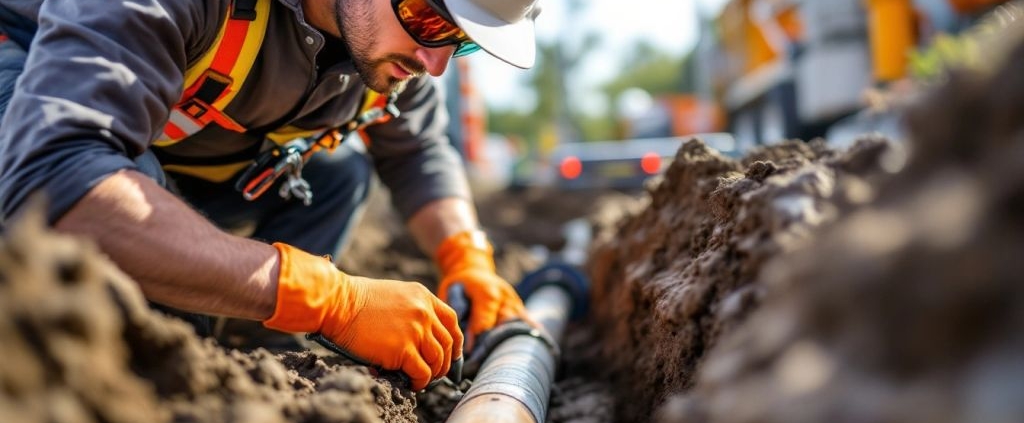How to Choose a Trenchless Plumbing Contractor: Key Factors to Consider
Evaluating Contractor Experience and Expertise

When choosing a trenchless plumbing contractor, experience and expertise are crucial. A contractor with a solid background in trenchless technology can handle various plumbing issues effectively. Here are some key points to consider:
Importance of Proven Track Record
- Look for contractors who have successfully completed multiple trenchless projects.
- Ask for references or case studies to understand their past work.
- A strong track record often indicates reliability and skill.
Assessing Technical Skills
- Ensure the contractor has the necessary technical skills for trenchless methods.
- Check if they are familiar with the latest tools and technologies in the field.
- Consider their ability to troubleshoot and solve unexpected problems during the project.
Understanding Trenchless Technologies
- Familiarize yourself with different trenchless methods, such as pipe bursting and slip lining.
- Ask the contractor about their experience with these technologies and how they apply them.
- A knowledgeable contractor will explain the benefits and limitations of each method clearly.
In summary, selecting a contractor with a proven track record, strong technical skills, and a deep understanding of trenchless technologies will help ensure a successful plumbing project.
Verifying Licenses and Certifications
When selecting a trenchless plumbing contractor, verifying their licenses and certifications is crucial. This ensures that the contractor meets the necessary legal and professional standards required for the job.
Essential Licenses for Plumbing Contractors
To operate legally, plumbing contractors must hold specific licenses. Here are some key licenses to look for:
- C-36 License: This is a general plumbing license required for all contractors performing plumbing work inside homes.
- C-42 License: This license allows contractors to work on sewer systems and similar pipes, including storm drains and septic tanks.
- A-License: This is for contractors with specialized engineering skills for work on public infrastructure.
- B-License: A general building license needed for constructing or renovating buildings.
Certifications to Look For
In addition to licenses, certifications can indicate a contractor’s expertise and commitment to quality. Look for:
- NASSCO Pipeline Assessment Certification: This shows training in pipeline assessment techniques.
- American Society of Civil Engineers Membership: Indicates professional recognition in civil engineering.
- Better Business Bureau Accreditation: Reflects a commitment to customer service and ethical business practices.
Ensuring Compliance with Industry Standards
It’s essential to confirm that the contractor adheres to industry standards. Here are steps to ensure compliance:
- Request documentation: Ask for copies of licenses and certifications.
- Check for insurance: Ensure the contractor has liability insurance to protect against accidents.
- Verify with local authorities: Contact local licensing boards to confirm the validity of the contractor’s licenses.
Remember, hiring a licensed and certified contractor not only protects you legally but also ensures that the work is done correctly and safely.
Assessing Reputation and Customer Feedback
Reading Online Reviews
When looking for a trenchless plumbing contractor, online reviews can provide valuable insights. Check platforms like Google, Yelp, and Angie’s List to see what previous customers have said. Look for patterns in feedback, such as:
- Consistent praise for quality of work
- Comments on timeliness and professionalism
- Any recurring complaints about service or pricing
Seeking Recommendations from Peers
Another effective way to assess a contractor’s reputation is by asking for recommendations from friends, family, or neighbors. Personal experiences can often give you a clearer picture of what to expect. Consider asking:
- Who did they hire for their plumbing needs?
- Were they satisfied with the work?
- Would they hire the contractor again?
Evaluating Customer Satisfaction
Customer satisfaction is key to choosing the right contractor. Look for customer reviews and testimonials that highlight their experiences. For example, one customer mentioned, "Michael and his team were very professional and reliable. Michael recognized the severity of the issue and was able to prioritize my work and had a crew on site…" This kind of feedback can help you gauge the contractor’s reliability and quality of service.
Understanding Service Guarantees and Warranties
When hiring a trenchless plumbing contractor, it’s essential to understand the service guarantees and warranties they offer. These assurances can greatly impact your overall satisfaction and the longevity of the work performed.
Importance of Workmanship Guarantees
A reliable contractor will provide a workmanship guarantee, which shows their confidence in the quality of their work. This guarantee typically covers:
- Defects in workmanship for a specified period.
- Repairs needed due to improper installation.
- Customer support for any issues that arise post-service.
Reviewing Warranty Terms
Before signing a contract, carefully review the warranty terms. Key points to consider include:
- Duration: How long does the warranty last?
- Coverage: What specific issues are covered?
- Transferability: Can the warranty be transferred to a new owner if you sell your home?
Ensuring Long-term Support
Long-term support is crucial for maintaining your plumbing system. Look for contractors who offer:
- Regular maintenance checks to ensure everything is functioning well.
- Emergency services in case of unexpected issues.
- Clear communication about what to expect during and after the service.
Understanding the warranties and guarantees your plumbing contractor offers can significantly affect your long-term sewer line service costs. When hiring a contractor, make sure to ask about these important aspects to avoid future headaches.
When it comes to service guarantees and warranties, understanding the differences can really help you make smart choices. A service guarantee promises that a job will be done right, while a warranty covers repairs if something goes wrong later. If you want to learn more about how these can benefit you, visit our website today!




Leave a Reply
Want to join the discussion?Feel free to contribute!